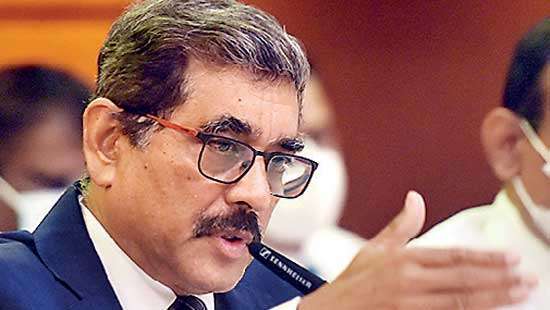Reply To:
Name - Reply Comment

The Central Bank yesterday announced a slew of measures in a bid to ride the current economic emergency, caused by the severe dearth in foreign currency in the domestic market, until any deal could be struck with the International Monetary Fund (IMF) for a rescue package.
|
The Central Bank of Sri Lanka yesterday announced that a mandatory requirement would be imposed, under which all payments for imports should be made via the banking systems. Central Bank Governor Dr. Nandala Weerasinghe said the banks would be requested to provide the essential foreign currency payments for Sri Lankan students studying overseas. He also said the default status of loans would be not changed |
The measures are aimed at improving the dollar liquidity in the domestic foreign exchange market by drawing foreign currency as much as possible from the formal banking channels and thereby substantially narrowing the black-market premiums that are prevalent at present.
Although many were hoping that some emergency assistance would be forthcoming at the conclusion of the initial talks with the IMF last week in Washington, the Fund will not extend any rapid financing but would engage with the authorities for a more medium-term Extended Fund Facility (EFF), which may run at least three years with a comprehensive macro-economic stability package.
That also hinges on the extent of the success of the government with its creditors with regard to debt restructuring.
Speaking at a press conference, Central Bank Governor Dr. Nandalal Weerasinghe said while a Staff-level agreement could be possible in two months with the IMF, any flow of funds from the Fund could only happen after the IMF Board in Washington gives their nod, a process which could take a couple more weeks. However, in order to manage the foreign currency situation, which is reaching a breaking point, the Central Bank announced a string of initiatives that could come in an all-encompassing circular shortly.
Providing a preview of what contains in their coming circular, Dr. Weerasinghe said the Central Bank took a decision to suspend imports under a system known as ‘Open Accounts’, where the importers used to bypass the formal banking system by making payments via Hawala and Undiyal. “Through these measures we try our best to draw foreign exchange transactions that happen outside the banking system into the banking system,” he said.
“To this effect, a circular would soon be issued suspending these imports that are happening in these channels, after allowing some period for those who have already used the Open Accounts method, with the aim of ensuring all import and export-related payments happen only through the banking channels,” Dr. Weeraisinghe added.
“So, we effectively close the avenue available for anyone to import by paying outside the banking system,” he made further clarity.
The formal systems that are available in the market to import goods via the banking sector are letters of credit, documents against acceptance (DA) terms and documents against payment (DP) terms.
It’s still unclear whether the suspension would apply even to trade via DA and DP terms but Dr. Weerasinghe made clear that some exception would be allowed for those who engage in the export trade such as apparel manufacturers, who are required to settle their suppliers in dollars.
While this suspension would effectively kill the demand for foreign exchange in the informal channels, the Central Bank renewed their calls to use the formal channels when repatriating all inflows through the banking channels, as the current rate offered by the banks is very attractive.
The United States dollar was quoted at between Rs.347/359 yesterday, more than a 70 percent plunge in the value of the rupee since it was allowed a full float on March 7.
In the absence of demand in the informal market for foreign exchange, the remitters would also be compelled to use the formal channels to send banks their money earned via exports or migration.
While Dr. Weerasinghe believes that the current exchange rate is overvalued, he expects the rate to somewhat ease when the formal foreign exchange market becomes fully functional and the demand for dollars declines as a result of the demand destruction measures taken a fortnight ago.
Meanwhile, the monies repatriated via formal channels also allow the authorities to ensure that these monies are channelled into essential imports. But when the money is sent via the informal channels, such foreign exchange goes in most cases into non-essential imports.
Further, the Central Bank has also requested banks to prioritise issuing foreign currency when the demand is for educational and healthcare reasons under humanitarian grounds, as the decline of such requests by the banks has drawn them to the informal channels, creating a thriving informal market.
Any shortfall would be met by the Central Bank if required.
Dr. Weerasinghe in the same vein said although these rules are imposed considering the current emergency economic situation, these would be gradually relaxed when the inflows are gradually reinstated considering the difficulties facing the businesses and individuals.
Besides the above measures, the Central Bank is also banking on the Indian line of credit with the size of US $ 1.5 billion, debt deferment enjoyed form India through the year end other multilateral funding support to help the country to meet the dollar demand to ride out the next two to three months till any rescue package is possible with the IMF.